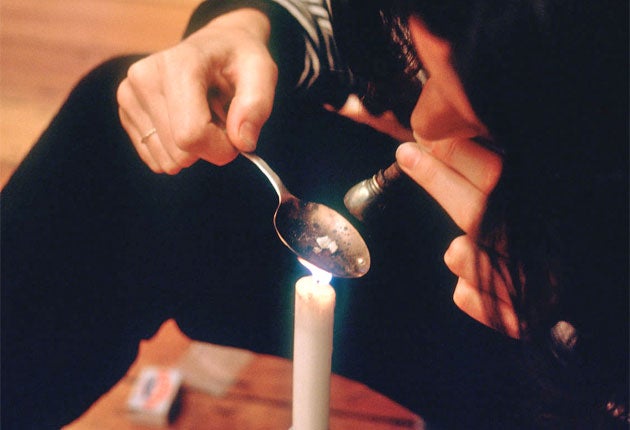How Britain failed to kick its drug problem
Labour admits it is no closer to beating addiction and crime despite 13 years of trying

Your support helps us to tell the story
From reproductive rights to climate change to Big Tech, The Independent is on the ground when the story is developing. Whether it's investigating the financials of Elon Musk's pro-Trump PAC or producing our latest documentary, 'The A Word', which shines a light on the American women fighting for reproductive rights, we know how important it is to parse out the facts from the messaging.
At such a critical moment in US history, we need reporters on the ground. Your donation allows us to keep sending journalists to speak to both sides of the story.
The Independent is trusted by Americans across the entire political spectrum. And unlike many other quality news outlets, we choose not to lock Americans out of our reporting and analysis with paywalls. We believe quality journalism should be available to everyone, paid for by those who can afford it.
Your support makes all the difference.Labour has failed to tackle properly the scourge of drug abuse in Britain, an influential House of Commons report says today.
Measures to reduce drug use by young offenders have had only limited impact and ministers admit that they still do not know how best to combat the wider problems associated with addiction and crime.
The cross-party Public Accounts Committee (PAC) described the Government's failure to evaluate the success or failure of its £1.2bn-a-year strategy as "unacceptable". The MPs found there were 330,000 problem users of heroin and crack cocaine who cost society £15bn a year, with crime accounting for £13.9bn of that.
But in their report, the MPs said the Home Office did not know whether a cross-Whitehall strategy launched in 2008 had reduced the cost of crimes committed by problem drug users. Nor could it "prove a causal link between the measures in the strategy and the levels of offending by problem drug users", the PAC said.
Worryingly, the report said that one quarter of all problem drug users were hard-core offenders for whom drug treatment was ineffective and whose offending had increased sharply after entering treatment. The committee concluded: "We consider that measures to reduce problem drug use by young people have had limited impact.
"Preventing young people from becoming problem drug users is important in bringing down the future number of problem drug users and the associated costs to society."
One recommendation in "hard cases" of addiction was to make greater use of residential rehabilitation, it said. But the report found that a long-stay treatment centre in Lincolnshire had recently been closed in line with the strategy of the Department for Children, Schools and Families in order to provide services for young people in the community.
Last month, Sir David Normington, the permanent secretary at the Home Office, told the PAC the Government had improved its work on maintaining the treatment of offenders. He said: "We are getting much better at keeping people in drug treatment and then meeting them at the prison gates and continuing them in treatment as they come out of prison, which is essential."
The Home Office has agreed from next year to publish annual reports on its progress in implementing the 10-year strategy. Edward Leigh, the PAC chairman, said: "Drug-related offending is inflicting a trail of misery on our communities. There are around a third of a million problem drug users in England who are costing society an estimated £15bn a year, mainly as a result of their criminal activity. And fully one quarter of all problem drug users are hard-core offenders for whom drug treatment is ineffective and, indeed, whose offending has sharply increased after entering treatment."
Martin Barnes, the chief executive of the charity DrugScope, said: "The links between problem drug use and crime can be complex but it is concerning that there is insufficient evidence to confirm whether the drug strategy is directly reducing the cost of drug-related crime."
However, he said it was unclear whether the committee's conclusions were focused primarily on heroin and crack cocaine or other drug use.
Case study: 'The agency is helping me get my life back'
'Ruth Smith', 45
"I got into drugs when I was 25, just smoking resin [hash] then within a year I had become 'hardcore' by injecting myself with heroin. All I did for 20 years was take 'brown' and all sorts of other drugs: amphetamines, valium amps, ketamine, coke, crack and heroin.
"In 2000 my husband was given six months to live because of liver damage, so we both gave up injecting and stuck to methadone linctus, and because of that he ended up living another six years. When he died I was so distraught that I went back to injecting brown again.
"I volunteered to go to a treatment centre as part of a contract to keep my council tenancy. One of the orders was to attend an agency for addressing my drug issues. I have stopped injecting for five months now. I now feel in a better place and my confidence has grown. The agency is helping me get my life back."
* Ruth's name has been changed
Join our commenting forum
Join thought-provoking conversations, follow other Independent readers and see their replies
Comments